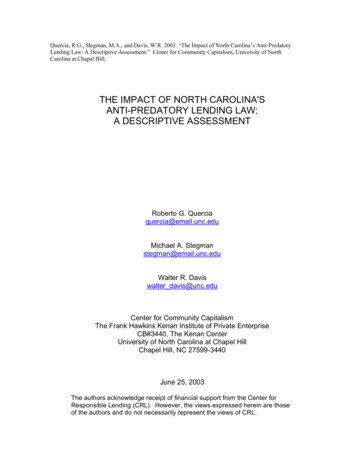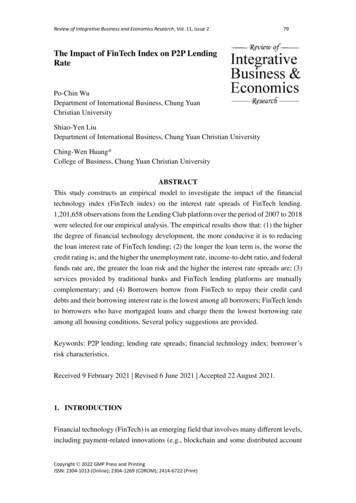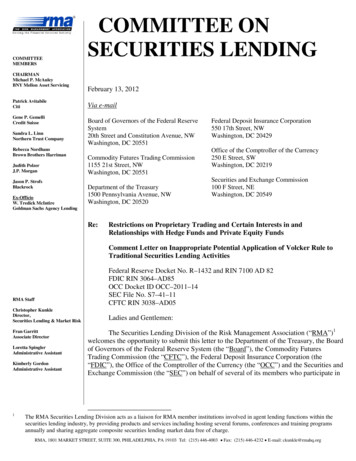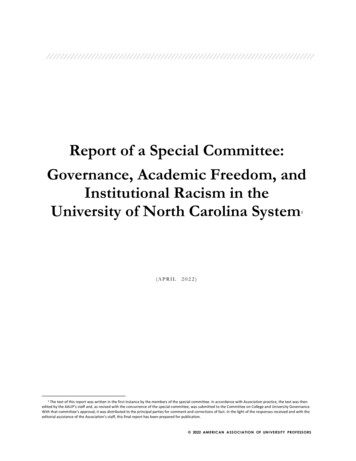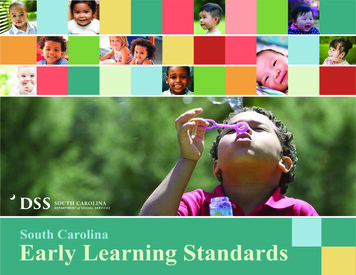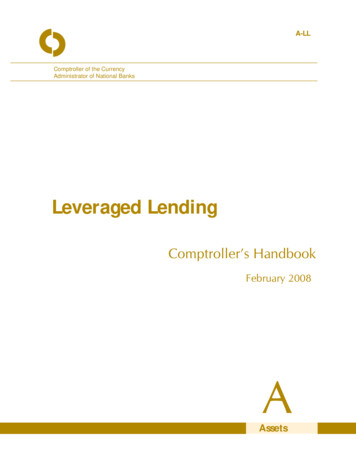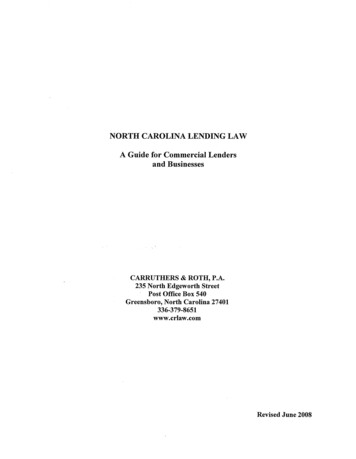
Transcription
NORTH CAROLINA LENDING LAWA Guide for Commercial Lendersand BusinessesCARRUTHERS & ROTH, P.A.235 North Edgeworth StreetPost Office Box 540Greensboro, North Carolina 27401336-379-8651www .crlaw.comRevised June 2008
TABLE OF CONTENTSINTRODUCTION . 1BASIC LEGAL STRUCTURE . 1AUTHORITY .3FUNDAMENTALS .9INTEREST AND USURY . 12CONFLICT OF LAW RULES . 13TYPES OF BORROWERS . 14REAL ESTATE LENDING . 18PERSONAL PROPERTY LENDING .27EQUIPMENT LEASING .36OTHER LAWS OF INTEREST .37(i)
I.INTRODUCTIONThe commercial laws of North Carolina are generally well established and lendthemselves well, from a lender's standpoint, to govern a commercial lending transaction. Thereare no usury or other type of interest rate limitations, liens are easily perfected and readilyenforceable, and the only real disadvantage is that jury trial waivers are unenforceable as amatter of law.This summary has been prepared as a summary of current North Caroline lending laws toprovide guidance to banks, commercial lenders, businesses and their respective attorneyscontemplating extensions of credit to North Carolina borrowers or perfection of liens in assetsthat are located in North Carolina or that are owned by residents of North Carolina. Sinceabbreviated, it does not purport to be a comprehensive review of the substantive laws of NorthCarolina on secured lending transactions.II.BASIC LEGAL STRUCTURECONSTITUTION: ·The North Carolina Constitution consists of 14 articleswhich, among others, includes provisions on finance,corporations, and exemptions from sale under judgmentsissued for collection of debts. Article V, Finance, providesfor taxation, limitations upon state debt, capital projects forindustry and agriculture, and higher education facilities.Article VIII, Corporations, provides for the chartering ofcorporations. Article X, Homesteads and Exemptions,though modified by statute, provides exemptions from salefor dwellings and certain personal property.STATUTORY LAW:The General Statutes of Nmih Carolina are comprised ofsome 368 separate chapters.Chapters impactingcommercial lending include the following: Chapter 24,Interest; Chapter 25, Uniform Commercial Code; Chapter42, Landlord and Tenant; Chapter 45, Mortgages andDeeds of Trust; Chapter 55, North Carolina BusinessCorporation Act; and Chapter 57C, North Carolina LimitedLiability Company Act.PROCEDURAL LAWS:The North Carolina Rules of Civil Procedure are found inChapter IA of the General Statutes ofNorth Carolina. TheNorth Carolina Rules of Civil Procedure mirror the FederalRules of Civil Procedure with few exceptions. Each countyhas adopted local rules of procedure as has each federaldistrict court.-2
ADMINISTRATIVE LAW:The North Carolina Administrative Code consists of 28titles and provides the framework for agency decisionmaking in North Carolina.The Departments ofAgriculture, State Auditor, Commerce, Environment andNatural Resources, Revenue and the North Carolina StateBar, to name a few, each have their own titles within theadministrative code. Set out within each such title arechapters which provide guidance to these departments ofthe government in managing the day-to-day business of theState of North Carolina. Disagreements with agencydecisions may be pursued through an appeal process set outin Title 26 which deals with the Office of AdministrativeHearing.LOCAL LAW:There are 100 North Carolina counties. Each has its owngoverning body. Within each county, there are typicallycity governments as well. Each such body has the authorityto promulgate ordinances and mles within the frameworkof the North Carolina General Statutes and theadministrative code.COURT SYSTEM:Each North Carolina county has both district and superiorcourts. In civil matters, jurisdiction is divided betweenthese courts depending on the amount in controversy.Where the amount in controversy is 10,000 or less, thedistrict court has jurisdiction while the superior court hasjurisdiction of amounts greater than 10,000 incontroversy. Each county has a Clerk of Court and aRegister of Deeds. UCC filings and deeds of tmst arerecorded in the Office of the Register of Deeds. Appealsfrom district and superior court are to the North CarolinaCourt of Appeals, except for appeals as a matter of rightdirectly to the North Carolina Supreme Court. Appealsfrom the North Carolina Court of Appeals lie to the NorthCarolina Supreme Court.North Carolina has 3 federal district courts: the UnitedStates District Court for the Eastern District of NorthCarolina located in Raleigh, the United States DistrictCourt for the Middle District of North Carolina located inGreensboro, and the United States District Court for theWestern District ofNorth Carolina located in Charlotte.-3
North Carolina is in the Fourth Circuit of the United StatesCourt of Appeals which is headquartered in Richmond,Virginia.III.AUTHORITYQUALIFICATION TO DOBUSINESS IN NORTHCAROLINA:A foreign corporation or foreign limited liability company(an "LLC") must obtain a certificate of authority from theNorth Carolina Secretary of State before transactingbusiness in North Carolina. N.C.G.S. § 55-15-01(a). Acertificate of authority is obtained from the North CarolinaSecretary of State by filing an executed original of anapplication for a certificate of authority. N.C.G.S. §§ 55 15-03(a); N.C.G.S. § 57C-7-02(a). In addition, theapplication must be accompanied by a certificate ofexistence of the foreign corporation or LLC from its stateof incorporation or organization and a filing fee of 250.N.C.G.S. §§ 5-15-03 and 55-1-22(a)(l9); 57C-7-04 and57C-1-22(a)(19).The determination of whether a foreign corporation or anLLC is transacting business in North Carolina is a questionof the facts and circumstances of each individual case. As asafe harbor, a foreign corporation or LLC will not beconsidered to be transacting business in North Carolina byengaging in one or more of the following non-exclusive listof activities: Maintaining or defending any action or suit or anyadministrative or arbitration proceeding, oreffecting the settlement thereof or the settlement ofclaims or disputes; Holding meetings of its directors or shareholders (ifa corporation), or managers or members (if anLLC), or carrying on other activities concerning itsinternal affairs; Maintaining bank accounts or borrowing money inNorth Carolina, with or without security, even ifsuch borrowings are repeated and continuoustransactions;-4
Maintaining offices or agencies for the transfer,exchange, and registration of its securities(including LLC membership interests), orappointing and maintaining trustees or depositorieswith relation to its securities; Soliciting or procuring orders, whether by mail orthrough employees or agents or otherwise, wheresuch orders require acceptance outside of NorthCarolina before becoming binding contracts; Making or investing in loans with or withoutsecurity including servicing of mortgages or deedsof trust through independent agencies within NorthCarolina, the conducting of foreclosure proceedingsand sale, the acquiring of property at foreclosuresale and the management and rental of suchproperty for a reasonable time while liquidating itsinvestment, provided no office or agency therefor ismaintained in North Carolina; Taking security for or collecting debts due to it orenforcing any rights in property securing the same; Transacting business in interstate commerce; Conducting an isolated transaction completedwithin a period of six months and not in the courseof a number of repeated transactions of like nature; Selling through independent contractors; and Owning, without more, real or personal property.N.C.G.S. §§ 55-15-01(b) and 57C-7-02(b).Domestic and foreign corporations must submit an annualreport, which may be delivered in paper form to the NorthCarolina Secretary of Revenue or in electronic form to theNorth Carolina Secretary of State. N.C.G.S. § 55-16-22(a).Domestic and foreign LLCs must submit annual reports tothe Secretary of State. N.C.G.S. § 57C-2-23(a). Theannual report for a corporation must be accompanied by afee of 25 if filed on paper or 18 if filed electronically.-5
N.C.G.S. § 55-1-22(a)(23) and (23a). The annual report foran LLC must be accompanied by a fee of 200. N.C.G.S.§ 57C-1-22(a)(25).LICENSING REQUIREMENTS: As a general rule, commercial lenders not based in the StateofNorth Carolina are not required to obtain any licenses tomake commercial loans in this State. However there areexceptions to the general rule, including the followingmaJor ones: Unless determined to be an exempt person pursuantto N.C.G.S. § 53-243.01(8), any person engageddirectly or indirectly in the business of makingresidential mortgage loans as a mortgage banker ormortgage broker, or to act as a loan officer onbehalf of a licensed mortgage banker or mortgagebroker, must be registered with the Commissionerof Banks. N.C.G.S. § 53-243.01 et seq. The actdefines a residential mortgage loan as one madeprimarily for personal, family or household use andprimarily secured by a mortgage or deed of trust onresidential real property located in North Carolina. A bank must obtain a license from theCommissioner of Banks before acting in anyfiduciary capacity without a bond. N.C.G.S. §53-160. A license is required to make loans m1der the NorthCarolina Consumer Finance Act.N.C.G.S. §53-166(a). However, the Consumer Finance Actdoes not apply to a company doing business underthe appropriate North Carolina statute as a bank,trust company, savings and loan association,cooperative credit llllions or agriculture creditcorporations. N.C.G.S. § 53-191. A license is required to sell or issue checks pursuantto the Money Transmitters Act.N.C.G.S. §53-208.3(a). However, this requirement does notapply to banks, savings and loan associations,savings banks, or mutual banks organized under thelaws of the United States or any state. N.C.G.S. §53-208.4(a). A non-exempt person is subject to the-6
Money Transmitters Act if the person makes moneytransmissions available to North Carolina citizensthrough an Internet website.N.C.G.S.§ 53-208.3(c).Any person engaged in the business of arrangingloans to be repaid from anticipated tax refunds mustregister with the Commissioner of Banks. N.C.G.S.§ 53-247(a). Loans to be repaid from refunds ofNorth Carolina taxes are prohibited. N.C.G.S. §§53-245(b) and 143B-426.40A. A license is required to engage in the check-cashingbusiness. N.C.G.S. § 53-276. Banks, savingsinstitutions, credit unions and other kinds offinancial institutions are exempt from thisrequirement. N.C.G.S. § 53-277. A license is required to act as a security broker orprivate banker. N.C.G.S. § 14-401.7. A "securitybroker" is "any person, banlc or corporation thatdeals in foreign or domestic exchange certificates ofdebt, shares in any corporation or chartercompanies, banlc or other notes, for the purpose ofselling the same or any other thing for commissionor other compensation, or who negotiates loansupon real estate securities." N.C.G.S. § 14-401.7.A "private banlcer" is "any person, banlc, orcorporation engaged in the business of negotiatingloans on any class of security or in discounting,buying or selling negotiable or other papers orcredits, whether in an office for the purpose orelsewhere. N.C.G.S. § 14-401.7. Although a national bank or a state bank charteredunder the laws of another state is not required toobtain a license to engage in banlcing activity inNorth Carolina, it is under the supervision of theCommissioner of Banks of North Carolina to theextent that such bank is transacting the business ofbanking within North Carolina and to the extent theauthority of the Commissioner of Banks is notpreempted by federal law. N.C.G.S. § 53-104.-7
TAXATION:Foreign corporations (and LLC's electing to be taxed ascorporations) are generally subject to North Carolinaincome taxes to the extent they have property and/oremployees located in North Carolina and/or generaterevenue in North Carolina. N.C.G.S. § 105-130.3. The taxis generally imposed at a rate of 6.9%. Corporations taxedunder subchapter S of the Internal Revenue Code are notsubject to the tax.In addition to income tax, a franchise tax is imposed on allcorporations for the privilege of doing business in NorthCarolina. N.C.G.S. § 105-122(a). The tax is generallyimposed upon the issued and outstanding capital stock ofthe corporation plus the corporation's surplus and undividedprofits. N.C.G.S. § 150-122(b). Corporations generallymust apportion capital stock, surplus and undivided profitsusing the fraction the corporation uses for apportioningincome tax (or, in the case of an exempt corporation, thatthe corporation would use if it were subject to the incometax). N.C.G.S. § 105-122(c1). The amount apportioned toNorth Carolina cannot be less than 55% of the ad valoremtax value of the corporation's investments in tangibleproperty in North Carolina. N.C.G.S. § 105-122(d). Inaddition, in the case of an international banking facility, thecapital base is reduced by the excess of the amount as ofthe end of the taxable year of all assets which are employedoutside the United States over liabilities owed to foreignpersons. N.C.G.S. § 105-122(b). The tax is imposed at arate of 1.50 per 1,000, with a minimum tax of 35.N.C.G.S. § 105-122(d).Although an LLC is not subject to North Carolina franchisetax, a corporation or affiliated group owning more thanfifty percent (50%) of the capital interests in an LLC mustinclude, for purposes of calculating the franchise taxliability of the corporation or affiliated group, a pro rataportion of the LLC's capital stock, surplus and profits, atleast 55% of the ad valorem tax value of the LLC'sproperty, and the LLC's actual investment in NorthCarolina tangible property. N.C.G.S. § 105-114.1. AnLLC with a total book value of less than 150,000 1sexempt from this requirement. N.C.G.S. § 105-114.1(f).An annual privilege tax is imposed on state and nationalbanks or banking associations that operate in North-8
Carolina as commercial banks, industrial banks, savingsbanks, trust companies or any combination of suchfacilities or services. The tax is imposed at the rate of 30per 1,000,000 of total assets. Total assets are determinedby averaging the total assets shown in the four quarterlycall reports of conditions (consolidating domesticsubsidiaries) for the preceding calendar year. The totalasset number is reduced by total assets employed outside ofNorth Carolina. In addition, in the case of an internationalbanking facility, total assets are reduced by the excess ofthe amount as of the end of the taxable year of all assetswhich are employed outside the United States overliabilities owed to foreign persons. Counties and cities arenot permitted to levy a license or privilege tax on bankstaxed under this section. N.C.G.S. § 105-102.3An annual privilege tax of 250 per business location isimposed on every person, firm or corporation involved inthe business of making loans or lending money, acceptingliens on, or contracts of assignment of, or other security orevidence of debt for repayment of such loans in installmentor otherwise. This annual privilege tax does not apply tobanks, industrial banks, trust companies, savings and loanassociations, cooperative trust unions, the business ofnegotiating loans on real estate, or insurance premiumfinance companies. N.C.G.S. § 105-88(b).IV.FUNDAMENTALSBASIC CONTRACT LAW:North Carolina contract law is not substantially differentfrom contract law in other states.However, NorthCarolina is one of only a few states which continues torecognize a document executed "under seal" as having legalsignificance (see Signature Requirements below). ). InNorth Carolina, a document executed "tmder seal" raises apresumption of consideration, Honey Properties, Inc. v.City of Gastonia, 252 N.C. 567, 571, 114 S.E.2d 344, 347(1960), which must be rebutted by clear and convincingevidence, Loman-Garrett Supply Co., Inc. v. Dudney, 56N.C.App. 622, 289 S.E.2d 600 (1982).Additionally, the statute of limitations applicable to asealed instrument is 10 years (N.C.G.S. § 1-47(2)),extending the statute of limitations from three years for-9
contracts in general (N.C.G.S. § 1-52) and four years forcontracts for the sale of goods (N.C.G.S. § 25-2-725).North Carolina has adopted the Uniform Commercial Code(including revised Article 9 which became effective July 1,2001). The Uniform Commercial Code establishes thebasic rules for contracts involving sales of goods,negotiable instruments, letters of credit, and securedtransactions. Effective January 1, 2005, North Carolinarepealed Article 6 of the Uniform Commercial Code whichapplied to certain bulk sales transactions. (N.C.G.S. § 25-6 101 et seq.)PROMISSORY NOTES:North Carolina law relating to promissory notes is notsubstantially different from relevant law in other states. Anobligation to pay reasonable attorneys' fees contained in apromissory note or other evidence of indebtedness is validand enforceable in North Carolina. If a note provides forthe recovery of attorneys' fees based on a specifiedpercentage of the outstanding balance of the obligation,then such provision is enforceable up to but not in excess of15% ofthe outstanding balance. N.C.G.S. § 6-21.2(1). If anote provides for the recovery of a reasonable attorneys' feewithout specifying a percentage, then the amount that theborrower must pay is 15% of the outstanding balance of thedebt. N.C.G.S. § 6-21.2(2). On the other hand, if the noteprovides for the recovery of a reasonable attorneys' fee notexceeding a sum equal to 15% of the outstanding balance,then the court must determine a reasonable percentagewithin the specified range. Jennings Communications Corp.v. PCG of Golden Strand, Inc., 126 N.C. App. 637, 486S.E.2d 229 (1997).GUARANTIES:North Carolina law recognizes both guaranties of collectionand guaranties of payment. Basic contract principles applyto guaranties and other types of suretyships, including therequirement of consideration (though the promise of thecreditor to extend credit to the borrower may serve asconsideration for the guarantor's promise to guaranty thedebt), the availability of contribution against the primaryobligor and other guarantors/sureties and defenses such asforgery. Unless a waiver of N.C.G.S. §§ 26-7 et seq. isobtained (see Other Laws of Interest below), the guarantormay effectively convert a guaranty of payment into aguaranty of collection. Absent a waiver, the guarantor may-10
give written notice to the holder of the guaranteedindebtedness requiring the holder to use reasonablediligence to recover against the primary obligor and anyproperties securing the indebtedness. Failure of the holderof the indebtedness to take appropriate action within 30days of service or receipt of the notice will discharge theguarantor giving the notice on the indebtedness, to theextent the guarantor is prejudiced. N.C.G.S. § 26-9.STATUTE OF FRAUDS:SIGNATUREREQUIREMENTS:North Carolina law requires that certain contracts be inwriting to be enforceable. Contracts requiring a writingexecuted by the party to be bound include contractscreating personal liability of an executor or administrator ofan estate and suretyship promises (N.C.G.S. § 22-1),contracts conveying an interest in land, including deeds oftrust, sales and leases for more than three years (N.C.G.S. §22-2), commercial loan commitments for loans in excess of 50,000 (N.C.G.S. § 22-5) and certain sales of goods with avalue in excess of 500 (N.C.G.S. § 25-2-201).Documents executed under seal have special characteristics(see Basic Contract Law above). The affixing of acorporate seal is not itself conclusive of a corporation'sintent to make a sealed instrument, i.e. to create a specialty.In order for a document or instrument to be a specialtyexecuted "under seal", either the body of the writing mustcontain language indicating the party's intent to create aspecialty or extrinsic evidence must demonstrate such anintention. Generally, the phrases "heretmto set my handand seal" or "witness our hands and seals" or like phraseswill suffice to show such intent. N.C.G.S. § 25-2-203;Square D. Co. v. C.J Kern Contractors, Inc., 314 NC 423,334 S.E.2d 63 (1985). Documents for the transfer of aninterest in land are presumed to be executed tmder seal.North Carolina has adopted the Uniform ElectronicTransactions Act (N.C.G.S. § 66-311 et seq.), whichprovides, among other things, that a contract w:ill beenforceable if it either contains an original signature or adigital signature or is made expressly valid through anotherform of consent. The Act applies to transactions which theparties have agreed to conduct electronically; however, theAct is not applicable to transactions governed by Article 9of the Uniform Commercial Code, and therefore it has no-11
usefulness in expediting and facilitating the execution oflending documents generally. N.C.G.S. § 66-313.v.INTEREST AND USURYGENERALLY:COMMERCIAL LENDINGRATE;GENERALLY,NOUSURY LIMITS:METHODS OF INTERESTASSESSMENT:WHEN INTEREST MAYBEGIN TO ACCRUE:This section applies to commercial loans made to businessentities. Special interest and consumer protection lawsapply to most loans to individuals.N.C.G.S. § 24-9 defines an "exempt loan" as one where (1)the borrower is not a natural person, (2) the principalamount of the loan is 300,000 or more, or (3) the borroweris a natural person and the loan is for a purpose other than apersonal, family or household purpose. In an exempt loantransaction the borrower may agree to pay, and the lendermay charge and collect from the borrower, interest at anyrate and fees and other charges in any amount that theborrower agrees to pay. A claim or defense of usury isprohibited in an exempt loan transaction.North Carolina has no specific laws, cases or regulations inwhich any method for the calculation of interest is required.N.C.G.S. § 24-3 provides that interest is due and payableon instruments as follows: All bonds, bills, notes, bills of exchange, liquidatedand settled accounts (provided such liquidated andsettled accounts are signed by the debtor) bearinterest from the time they become due, unless it isspecially expressed that interest is not to accrueuntil a time mentioned in such writings orsecurities.All bills, bonds, or notes payable on demand aredue when demandable by the creditor, and bearinterest from the time they are demandable, unlessotherwise expressed.-12
POINTS, FEES AND OTHERLOAN CHARGES:ADDITIONAL FEES ANDCHARGES: All securities for the payment or delivery of specificarticles bear interest as moneyed contracts; and thearticles shall be rated by the jury at the time theybecome due. Bills of exchange drawn or indorsed in NorthCarolina, and which have been protested, shall carryinterest, not from the date thereof, but from the timeof payment therein mentioned.As mentioned above, in an "exempt loan transaction" alender may charge fees and other charges in any amount theborrower agrees to pay.No lender may impose a late payment charge for anypayment unless past due for 15 days or more (or 30 days inthe case of an installment obligation for which interest ispaid in advance) and then only in an amount not in excessof 4% of the amount of the past due payment. N.C.G.S. §24-10.1.VI.CONFLICT OF LAW RULESGENERALLY:In the absence of a contractual provision providing for thechoice of law to govern a contract, interpretations ofcontracts generally will be determined by the doctrine oflex loci celebrationis (also sometimes referred to as lex locicontractus), which applies the law of the jurisdiction inwhich the last act occurs essential to the meeting of theminds necessary for the creation of the enforceablecontract. A North Carolina court should enforce that state'slaws, if different from North Carolina, unless: the contract is against North Carolina public policyor is contrary to good morals; North Carolina, or its citizens, would be injured bythe enforcement of the contract; the contract violates the constitution or statutes ofthe State ofNorth Carolina;-13
CONTRACTUAL CHOICEOF LAW PROVISIONS: the contract is entered into for the purpose ofavoiding the usury laws of the State of NorthCarolina; the contract is for a loan secured by land located inthe State ofNorth Carolina, in which case the usurylaws of the State ofNorth Carolina will apply; the contract relates to the sale or conveyance of aninterest in real estate located in the State of NorthCarolina; or the contract is for insurance on "property, lives, orinterests" in the State of North Carolina or theapplication for the insurance contract was takenwithin the State ofNorth Carolina. N.C.G.S. § 58 3-1.Contractual choice of law provisions will be enforced in theState of North Carolina provided the transaction bears areasonable relation to the state whose laws are chosen bythe parties to govern the transaction. N.C.G.S. § 25-1 105(1) provides that when a transaction bears a reasonablerelation to this State and also to another state, the partiesmay agree that the law either of this State or of such otherstate shall govern their rights and duties.VII.TYPES OF BORROWERSCORPORATIONS:Ordinary business corporations, which are subject to theNorth Carolina Business Corporation Act (N.C.G.S. § 55 1-01 et seq.), constitute the majority of private corporationsoperating in North Carolina.The North Carolina Business Corporation Act generallydoes not apply to nonprofit corporations without capitalstock, which are governed under Chapter 55A of the NorthCarolina General Statutes. There are also several othertypes of corporations that are treated tmder special statutoryprovisions, such as banking corporations, professionalcorporations, business development corporations, insuranceGOmpanies, nonprofit hospital service corporations,railroads, and various types of cooperative organizations-14
such as savings and loan associations, credit unions, landand loan associations, and miscellaneous cooperative andmarketing associations.PARTNERSIDPS:There are three types of partnerships recognized in NorthCarolina: (1) general partnerships; (2) limited partnerships;and (3) registered limited liability partnerships.No written partnership agreement is required to form aNorth Carolina general partnership. There are also norequirements that a North Carolina general partnershipregister with the Secretary of State. However, a Certificateof Assumed Name must be filed with the local register ofdeeds if the business is conducted under an assumed name.(N.C.G.S. § 66-68). In general, the provisions of the NorthCarolina Uniform Partnership Act (N.C.G.S. § 59-31 etseq.) will apply to a North Carolina general partnershiponly if a particular issue is not addressed by a partnershipagreement. However, in a few cases, including thoseinvolving a partner's fiduciary duties, the principles of theUniform Partnership Act may not be changed byagreement. This Act also governs the procedures underwhich foreign limited liability partnerships may qualify todo business in North Carolina.The provisions of the North Carolina Revised LimitedPartnership Act (N.C.G.S. § 59-101 et seq.) apply tolimited partnerships. A certificate of limited partnershipmust be filed with the North Carolina Secretary of State.North Carolina limited partnerships also are required tohave both a registered office in North Carolina and aregistered agent for service of process in North Carolina.The Revised Limited Partnership Act also governs theprocedure under which foreign limited partnerships mayqualify to do business in North Carolina.As with general partnerships, the provisions of the NorthCarolina Uniform Partnership Act (N.C.G.S. § 59-31 etseq.) apply to registered limited liability partnerships. Anapplication for registration must be filed with the NorthCarolina Secretary of State. Registered limited liabilitypartnerships must also file an annual report with theSecretary of State.-15
Partners in a general partnership, as well as general partnersin a limited partnership, are jointly and severally liable forthe acts and obligations of the partnership. A partner in aregistered limited liability partnership is not individuallyliable for the debts and obligations of the partnership solelyby reason of being a partner or participating in themanagement or control of the partnership. A registeredlimited liability partner is also not individually liable forthe errors or malpractice committed by another partner oremployee of the partnership. However, a registered limitedliability partner remains liable for his own errors ormalpractice in the rendering of professional services.N.C.G.S. § 59-45. The liability of limited partners islimit
North Carolina Secretary of State before transacting business in North Carolina. N.C.G.S. § 55-15-01(a). A certificate of authority is obtained from the North Carolina Secretary of State by filing an executed original of an application for a certificate of authority. N.C.G.S. §§ 55 15-03(a); N.C.G.S. § 57C-7-02(a).
